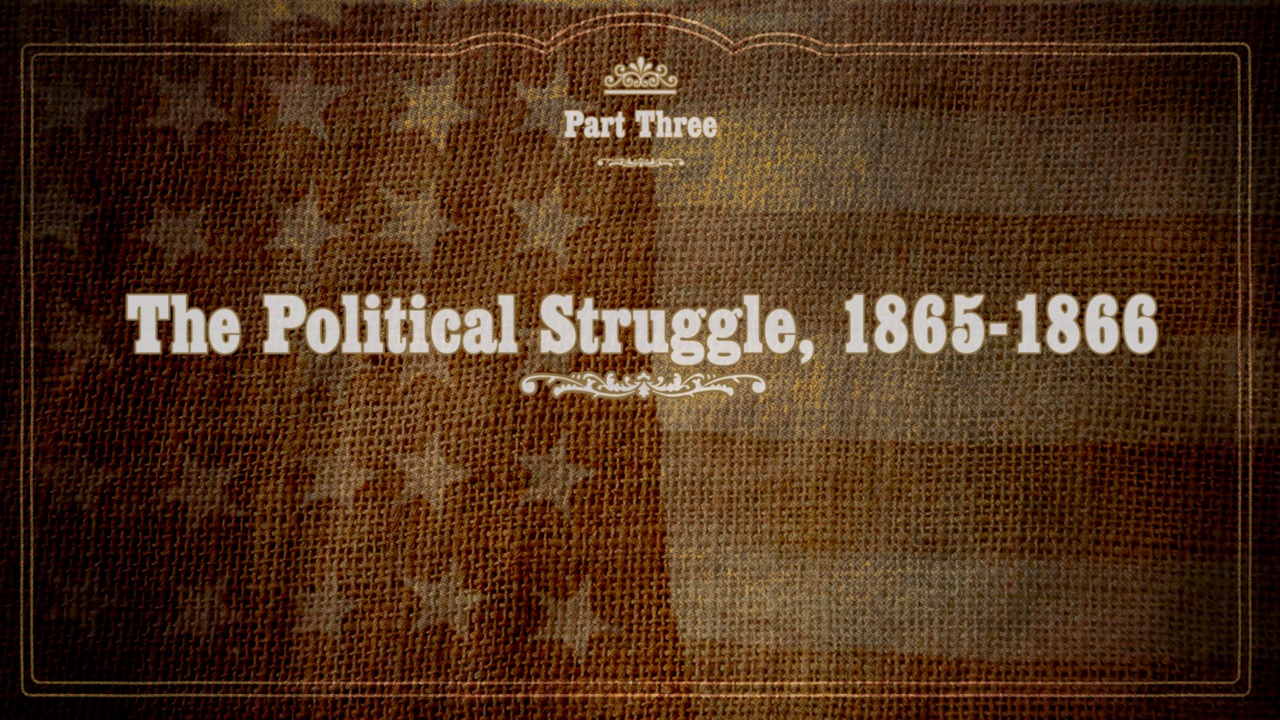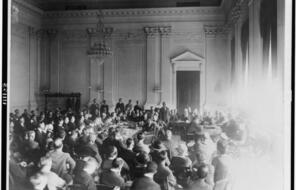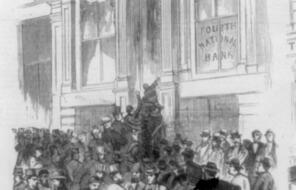Breadcrumb
This resource is part of:
Part Three: The Political Struggle, 1865-1866
Video Length
16:28Subject
- History
Language
English — USUpdated
Part Three: The Political Struggle, 1865-1866

[MUSIC PLAYING]
Reconstruction in many ways was a continuation of the Civil War itself. And the fields of battle shift from the battlefields in the South to the halls of Congress.
Who is going to rule the federal government now, and determine this policy of reconstruction of how the Union would be put back together. And by that I mean, would it be the president, the executive branch, or would it be Congress? Those two sides have fundamentally different visions of what reconstruction would be.
[MUSIC PLAYING]
And it has a lot to do with this problem, this vast problem, of how do you begin to heal from such an all-out terrible war? How do you get healing? But then also how do you balance all that necessary healing with questions of justice?
Could you have racial justice along with healing, binding the wounds of the war? Could you bring North and South together? Could you bring white Northerners and white Southerners together, if you had African-Americans and their hopes and aspirations at the center of what the nation could be? And those two ideals ran against one another, and spoke to just why Reconstruction was so contentious. Why it was so highly fraught.
[MUSIC PLAYING]
If you really want to understand the dynamic as it unfolded after the assassination of Abraham Lincoln, you have to come to terms with the presidency of Andrew Johnson.
Johnson was not a Republican. He was a Democrat. He was a strong unionist. He was from Tennessee. He had opposed the secession of Tennessee. He was the one senator from a seceding state who remained in the Senate.
Lincoln later appointed him Military Governor of Tennessee. And he was put on the ticket in 1864 to show Republicans sort of respect for the white pro-Union people in the South, and as a way of looking forward to, these are the people Republican Party is going to appeal to in the South once the war is over. Because before the Civil War, the Republicans didn't even exist in the South. Now they want to move into the South as a party, appealing to people like Andrew Johnson.
He was added to the ticket in that way that vice presidents are often added to the ticket, not even thinking that anything terrible could happen to the president. Well when it did, the Northern people woke up the day after Lincoln died-- not only soaking in the tragedy and the horror of this act of assassination-- but also realizing that their president was a former slave holder from Tennessee, who was really a Democrat and not a Republican.
[MUSIC PLAYING]
Johnson was also a virulent white supremacist. It was necessary to end slavery and all of the power that slavery brought, especially to the planter class of the South. And Andrew Johnson grew up working class. He grew up poor. And he had nothing but contempt for the great planter class of the South. But he also was a staunch state's rightist. He did not want the powers of the federal government expanded at all.
[MUSIC PLAYING]
What Johnson is hoping he can do is pick up the Democrats in the North, because the Democrats are a viable group in a number of states. If he can pick them up, and knit them together with the Democrats in the South, he's got this pre-Civil War coalition back together.
Many people-- millions-- especially on the losing side in the South, but many whites in the North too, wanted some version of an aftermath of the Civil War that was supposed to be the Union as it was but the Constitution as it is. In other words restore the Union-- fought an all-out war to save the Union-- but don't alter the Constitution. Don't change who has the right to vote, who has civil rights, and who has civil liberties. Others, of course-- many, many Northern Republicans and certainly most blacks-- were saying, no, no, no, the Union as it was. But a whole new Constitution is necessary.
[MUSIC PLAYING]
The Republicans in Congress have a dilemma. First of all, they're not in session when Lincoln was assassinated. They expect that Johnson is going to call them back into session-- which a president can do-- and Johnson says, no thanks, guys, I got this, and I'm going to take care of this myself. Because he's trying to put together a world that looks very much like before the war, before the Republicans got their hands on the governments, before they expanded to help everybody. So the Republicans can't really do anything. They have no power until Johnson calls them back into session, or until their session starts.
[MUSIC PLAYING]
Reconstruction begins with Johnson in May, 1865, issuing a series of orders appointing new governors for most of the Southern states, and setting out requirements for these states to get back into the Union. And the requirements he set out are minimal. They have to ratify the 13th Amendment-- that is acknowledge the end of slavery. They have to repudiate secession. And then later he goes on they have to repudiate the Confederate debt-- they can't pay off people who had loaned money to the Confederacy. And that's it. Nothing in there about the rights of black people at all.
And they do as he asked, but they also passed the Black Codes, which are an attempt to put African-Americans back into, at the very least, serfdom. But there are pieces of all those laws that essentially re-establish slavery.
He had tried to keep the old planter class out of power by saying, anyone who owned more than $20,000 before the Civil War in property would have to get a special pardon from him to take part in politics. So he was trying to keep them off to the side. But no, it didn't work out that way.
[MUSIC PLAYING]
By the end of the summer of 1865, he has pardoned all but about 1,500 Southern Confederates, which is astonishing if you think about it. This is a war that took over 600,000 lives, over $2.5 billion. And only a matter of months after it, the same men who started the war, are in charge of bringing the South back in.
Some people will return to Congress in December 1865, less than a year after Appomattox, even donning their Confederate uniforms. Alexander H. Stephens from Georgia had been vce president of the Confederacy, was elected to Congress from Georgia.
As soon as Congress gets back into session, Johnson addresses them. And he says, Reconstruction is over. I took care of it while you guys were out. He doesn't call it Reconstruction actually, he calls it restoration. He has restored the South to the Union.
And he says it needed to be done quickly. If we had left the military in the South, it would have made Southerners unhappy. So right there he's defining Southerners as white people. It would have made Southerners unhappy, and it would have been far too expensive. Now all you guys have to do is you have to seat the senators and congressmen who are here in Washington waiting to be seated.
And the Republicans in Congress threw up a wall, threw up the halt sign. Said, stop. No, no, no, no. This isn't going to happen. Their vision of Reconstruction was that it should be much longer, much harsher, and run by Congress.
The Republican majority in Congress says, no, these guys are not yet ready to serve. And so it's pretty much a Northern Congress. The Republican Party has a significant majority, but the Republican Party is divided among itself.
There are-- the mainstream, moderate Republicans are the majority. And basically they feel Johnson's made a lot of mistakes, but we got to work with him. He's set up these governments. They're functioning. We've got to sort of work with Johnson to make this situation better, to protect the rights of the blacks a little better, and try to keep these Confederates out. But basically let's take Johnson's system that he's put in place and just improve it.
Then there were the radical Republicans. People like Thaddeus Stevens from Pennsylvania in the House, Charles Sumner from Massachusetts in the Senate, they basically say, forget it. Johnson's plan is terrible, we've got to get rid of it. And very quickly what they want is black suffrage, black male suffrage.
Nobody, unfortunately, is talking about women voting at this time. But most Republicans are not willing to go for black suffrage at this time. You know, only five Northern states allow black men to vote at this point. Most Northerners did not want blacks voting.
And so a lot of Republicans say this is dangerous politically. We're not going to get very far with this. So they-- the moderates come forward with their own plan. Which is, as I say, let us make Johnson's policy better.
[MUSIC PLAYING]
And the way to do that is to pass a law-- the Civil Rights Act of 1866-- to guarantee the basic rights of the former slaves. It recognizes Johnson's governments-- they're there-- but they've been so discriminatory, now we're going to have the federal government overrule them, and by federal law give black people the same civil rights-- not the right to vote-- go to court, own property, sue and be sued, have the same basic rights within the legal justice system as white people.
Johnson could have signed it and saved himself a lot of trouble, but he vetoes the law. He says, no, my plan is perfect. I don't want this. And moreover, I don't think blacks should have the same rights as white people. Nothing in our history suggests they should. The law discriminates against whites. It's giving all this help to blacks and not to whites, and he vetoes it. And Congress passes it over his veto-- the first major law in American history passed over the veto of the president.
And that really is the split between Johnson and Congress, and it leaves the moderates kind of bereft in that what are they going to do now. They wanted to work with Johnson, but Johnson doesn't want to work with them, is basically the problem.
[MUSIC PLAYING]
When Andrew Johnson was so obstinate to their plans for Reconstruction, he converted, frankly, a lot of white Northerners over to the Republicans' cause. Because, let's face it, it was only a year after the war, a year and a half, even two years. And millions of Northerners had just fought this bloody war, and they'd lost their brothers and their sons. And Andrew Johnson is just going to let all the Southern states back in the Union, and say it's over, get over it. Let's all be nice again, reunion, reunion. Northerners were not ready for that.
[MUSIC PLAYING]
But that gives them a dilemma. If they're not going to reconstruct the government based on the way Johnson wants to do it, what are they going to do? Well the first thing they do-- as Congress always does-- is they make a committee. They're getting petitions from everybody. They're discussing stuff all the time. There's lots of testimony. There's many things going on. When they finally come out with a proposal, it's the 14th Amendment.
[MUSIC PLAYING]
It still doesn't give black men the right to vote. But it puts the principle of birthright citizenship and equality among citizens into the Constitution.
[MUSIC PLAYING]
That 14th Amendment is going to enshrine that phrase that we all have this right to equal protection of the law. Now that has a million different possible interpretations, but everyone now gets to have a piece of that, supposedly, gets to identify somehow with a nation-state which is going to guarantee everybody some kind of equality before law. That's a revolution.
[MUSIC PLAYING]
Johnson opposes it. Johnson tells the Southern states not to ratify it.
[MUSIC PLAYING]
In the fall of 1866, there's elections, Congressional elections. And the Republicans win even greater power. People supporting Johnson's policies are defeated in the North.
And, basically, by this point, more and more Republicans are saying these radicals have a point here. And now, by the end of 1866, beginning of 1867, the radicals say, OK, you see here's our point. You cannot work with Johnson. The governments he set up are no good. The only way out is black suffrage. We've got to create new governments in the South with black and white-- in other words, democracy, to put it in a simple way. Let men vote, black and white, and then we'll have a real democratic government in the South.
And that's what Congress does in March 1867. They passed the Reconstruction Acts, which basically throw out the Johnson governments, and create a situation for the election of new constitutional conventions in the South, to create new governments in the South, new elections in the South. The first experiment in interracial democracy in American history. That is the radical triumph in early 1867.
[MUSIC PLAYING]
Part Three: The Political Struggle, 1865-1866
How to Cite This Video
Facing History & Ourselves, “Part Three: The Political Struggle, 1865-1866”, video, last updated May 13, 2015.
You might also be interested in…
Resources for Civic Education in California

Resources for Civic Education in Massachusetts

Discussing Contemporary Islamophobia in the Classroom

Confronting Islamophobia

Exploring Islamophobic Tropes

Addressing Islamophobia in the Media

Understanding Gendered Islamophobia

Standing Up Against Contemporary Islamophobia

Monuments to Japanese American Incarceration

Words Matter: Listening to Survivors about Language for Describing Japanese American Incarceration

Backlash and the KKK

Shifting Public Opinion


